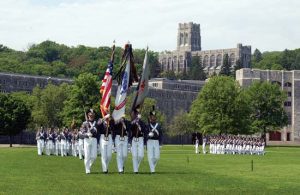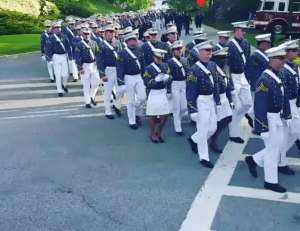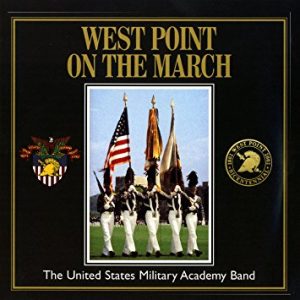


Looks like General Caslen and others are missing the 5 9’s reliability.
A letter to:
Lieutenant General Robert L. Caslen, Jr.
59th Superintendent
U.S. Military Academy, West Point
Dear General Caslen,
I have just read your long letter prompted by the Rapone affair. I have
also a lot to write about the situation.
First, I am not pleased with LTC Heffington’s story in his affidavit. In my
day no officer would have deigned to argue with a cadet, even a First
Classman. He would have simply told the cadet to return to his room. If
the cadet disobeyed he would have called the Officer of the Day to have the
cadet physically moved to his room. And he would have written up the cadet
for disobeying the direct order of a superior officer, plus disrespect to an
officer and being out of uniform. LTC Heffington may well lament the rot in
the administration and training of cadets, but he obviously was a part of
it.
Second, why was no investigation begun in November 2015 based upon LTC
Heffington’s affidavit? Regardless of what the investigation would have
concluded, the fact that none was initiated is another example of the rot
that is permeating the USMA. Somebody simply decided to pass the problem
along to the Army. In addition, why was he allowed to graduate? As a
professed Communist he could not truthfully have sworn allegiance to the
Constitution of the United States. Yet he apparently lied and did. His
views were known and yet he was permitted to commit perjury.
Third, you write “While we do not compromise standards, we are a
developmental institution.” When did West Point become a “developmental
institution? What does that even mean? West Point was created in order to
furnish standard-setting, career officers for the United States Army. And
it did that job well until the latter half of the twentieth century. And it
accomplished its mission on an “attritional” and a “zero tolerance” basis.
What does “developmental” mean? Maybe it means that a cadet can be caught
lying twice, but if he is caught lying a third time, i.e., he has not
“developed”, he will be sent before the Honor Board, that may even decide
the cadet needs a little more “development” and gives him three more
chances. I remember that when I was a plebe, and maybe even my first day, I
was made to understand that lying or quibbling was not allowed and would
mean rapid dismissal. Maybe “development” means being able to discuss an
order given by a superior officer. Rot! Maybe “developmental” means that
an upper classman inspecting a plebe in ranks (if such a thing is still
tolerated) says “Mister, your shoeshine looks better today than yesterday,
but it still needs some work. So, try to do better tomorrow.” Rot!
Fourth, you write, “These changes have increased the realism, toughness, and
challenge of our developmental programs, resulting in the most capable and
confident young leaders of character that we have ever produced”. This is
gratuitously denigrating all previous graduates. Do I need to remind you
that previous classes produced leaders that saved this country more than
once. Your statement is pure PR. How can you possibly know that the
present generation of cadets are “the most capable and confident”? Have you
conducted any objective survey? Furthermore, the mission of West Point is
not to produce capable and confident second lieutenants. Its mission is to
produce the men and women who will lead the Army in the future. They should
be trained not to be second lieutenants, but future colonels and general
officers. At the 70th Reunion of my class last May you addressed all the
reunion classes. I took the opportunity to ask you what was the average
recent percentage of graduates who remain in the Army beyond their 5 year
commitment. You evaded replying to my question by stating that it was as
high as that of ROTC graduates. You seemed to be satisfied with that level.
It is not good enough. Graduates of the USMA are meant to set the standards
for the discipline and conduct of the personnel in the United States Army.
But if a graduate serves only his/her five years, his/her impact on the
standards of the Army is minimal to nil.
Fifth, you make a big deal of the ratings various publications give West
Point as a university. West Point is not a university. It is a school to
train standard-setting, career U.S. Army officers. Incidentally, cadets
receive a university-level education. You should care more about how many
of the graduates remain for a career in the Army than that such-and such a
publication ranks the USMA #? as a liberal arts/engineering/whatever
university. The same goes for athletics. Can you tell me that the
standards for admission are not today warped/waived in order to bring in a
star athlete? Can you tell me that special academic assistance is not given
to members of Corps Squads, particularly football. Can you tell me that
every prospective cadet must take a written exam and, good athlete or not,
must pass it in order to be allowed to enter?
Sixth, you make a big deal of having intercollegiate athletic teams with an
overall record of .590. So what! West Point was never supposed to be an
athletic powerhouse. I don’t believe the MacArthur quote that used to be
engraved over the entrance to the gym meant intercollegiate athletics, in
which only a small minority of the cadets participate. I believe it
referred to intramural athletics. I am all for intramural athletics. I
firmly believe that there is too much emphasis placed today on
intercollegiate athletics at West Point.
Seventh, you make a big deal about decorations recent graduates have
received. What about second lieutenants out of OCS or ROTC? Didn’t they
get any? Did they get less ? Maybe, because they weren’t “developed”.
Maybe, because they performed less well. Heroism is not a virtue exclusive
to West Point. What was once upon a time exclusive was the commitment to
graduate standard-setting career officers. This OCS and ROTC do not and
cannot do. OCS and ROTC base their standards, or at least they used to, on
those of graduates of West Point.
Eighth, you make a big deal that some recent graduates have been assigned to
divisions overseas. Where have you been? What’s so uplifting about that?
Every member of my class after finishing his branch Officers Basic Course
was assigned overseas-everyone. No big deal.
Ninth, I graduated under the previous so-called “attritional” and “zero
tolerance” system (as did all classes up to at least 1966. See Rick
Atkinson’s “The Long Gray Line”, the story of the Class of 1966). I
“developed” from a boy to a man on my own. Nobody gave a damn whether I
“developed”. I was expected from the first day to live up to the standards
of the Military Academy. It was up to me in meeting them to “develop”
myself. I seriously doubt that any of your “best and brightest” could even
have lasted through my plebe year.
Lastly, this letter started because of Second Lieutenant Rapone. Obviously
he didn’t “develop” as well as he should have.. How many more cadets are
being graduated under the “developmental” system who do not come up to what
have been the traditional standards of West Point: Duty, Honor, Country?
How many cadets are being graduated who have no intention, and never had any
intention, of being career Army officers / I doubt seriously that the
American taxpayer would be overjoyed to realize that he/she is paying,
what?, a half million dollars to give somebody a university education so
that he/she can leave the Army as quickly as possible and go into a
money-making civilian career. Although if there are a number of Rapones
whom you allow to graduate, it’s in the Army’s interest that they get out
fast.
Benjamin L. Landis
“Benjamin L. Landis retired from the U.S. Army as a colonel after a 27-year
career that included service with the Military Assistance Advisory Group at
the U.S. embassy in Paris and as Senior U.S. Liaison Officer with the French
Forces in Germany. He is a graduate of the U.S. Military Academy and the
French Army Ecole d’ Etat-Major, and has an MSA from The George Washington
University. After retirement, he was Director of Administration and Finance
for several major law firms in Washington. He is the author of Searching
For Stability: The World in the Twenty-First Century.”
Support References:
“How are people graduating from West Point so radicalized? Users on /pol/ think they may have found the answer: Professor Rasheed Hosein,” they tweeted.





